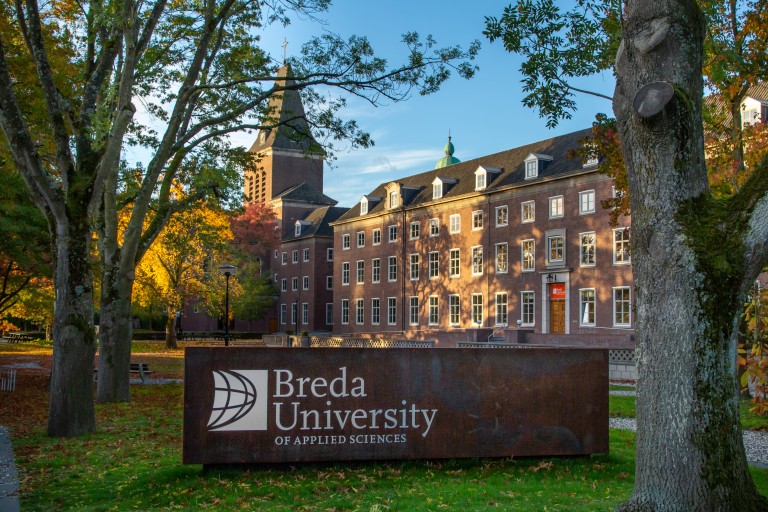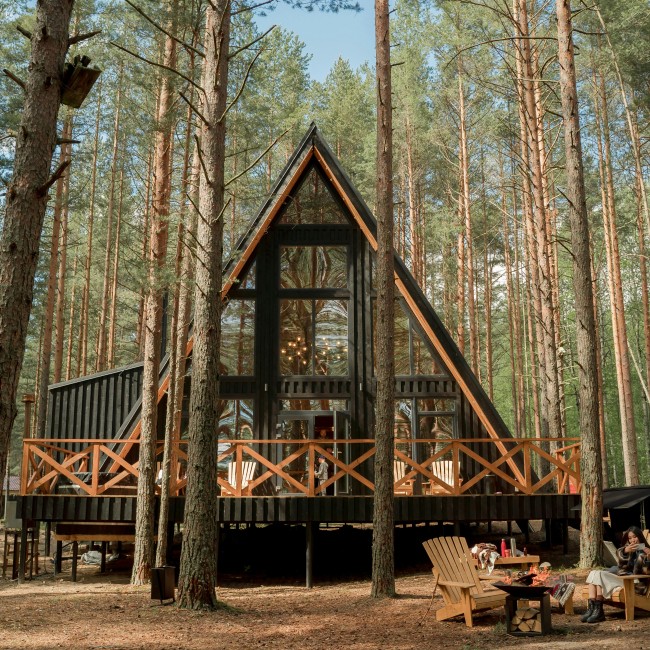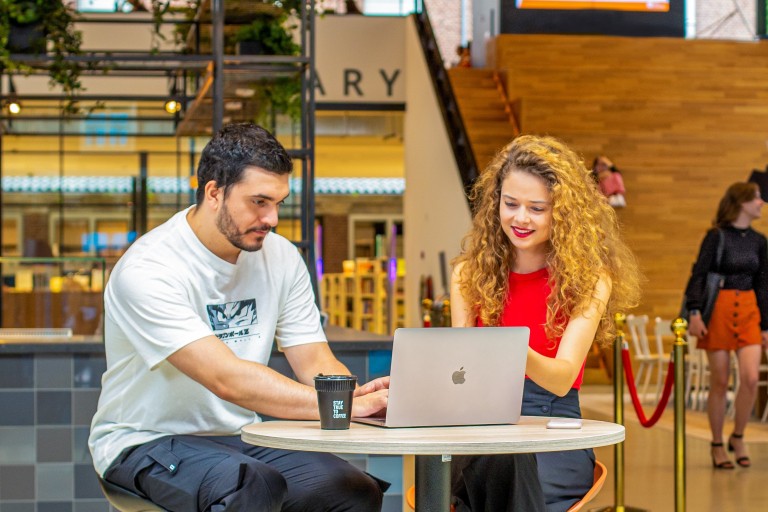Come and meet us
Walking around on campus is the best way to truly experience BUas. Sign up for one of the upcoming events or activities.
Study overview
In semester 1 of the English-taught Tourism and Hospitality Innovations master specialisation, you will attend lectures at Breda University of Applied Sciences together with the students of the Master Tourism Destination Management.
In semester 2, you will go to Opatija, in Croatia. You will dive into the sustainable management of camping resorts and visit companies in Italy, Slovenia and Croatia. You will gain insight into business challenges in park design, sustainable reporting, human resource management and strategic management.
After this semester you spend two months working as a trainee in the hospitality industry at one of the companies working with the master's globally. This offers the opportunity to work in high season and study in low season. At the same time, you will write a development plan for an outdoor hospitality destination. Examples of destinations of current students include Italy, Germany, France, the Netherlands and even Rwanda!
In semester 3, you will go to the University of Girona (Spain) to further develop your academic and business skills. In the final months, you will write a thesis.
An overview of all courses can be found below. Send an e-mail to [email protected] if you would like to receive the full description of all courses.
- Semester 1 – Breda University of Applied Sciences
This semester is about the 'Context of Tourism and Outdoor Hospitality’. You will take part in various study modules through lectures, workshops, excursions and guest lectures. Every week, you will attend compulsory classes on these modules:
- Destination Stakeholders Management (6 ECTS credits)
- Contemporary Marketing, Context and Trends (6 ECTS credits)
- Destination Development, Finance & Organisation (6 ECTS credits)
- Team Performance & Creative Leadership (2 ECTS credits)
- Cross Cultural Studies (3 ECTS credits)
- Qualitative Research Process Methods (7 ECTS credits)
- Semester 2 – University of Rijeka
Then the second semester starts. Between February and the end of May, you will take courses in ‘Business Operations and Management’. You will travel to the seaside resort of Opatija, Croatia, a top location in outdoor hospitality. The courses focus on developing business concepts in outdoor hospitality, featuring excursions, assignments and a project for a camping resort client. you will take compulsory classes on:
- Financial Reporting (3 ECTS credits)
- Sustainable Management in Outdoor Hospitality (9 ECTS credits)
- Customer Relationship and Sales Management (6 ECTS credits)
- Management and Operations (9 ECTS credits)
- Outdoor Hospitality Innovation (3 ECTS credits)
- Traineeship
Starting in June, as part of the Business Operations module, you will embark on a two-month traineeship. You will work at a company of your choice in the leisure sector, such as a campsite or eco-lodge. In addition, you will undertake a consultancy project for an outdoor hospitality tourism destination.
- Company Traineeship (12 ECTS credits)
- Destination Transformation Project (6 ECTS credits)
Curious about traineeship experiences? Read more about the experiences of our students.
- Semester 3 – University of Girona
The third semester between September and the Christmas break will take you to Girona, Spain. This semester is dedicated to honing your skills in critical analysis, strategic thinking and planning. A significant focus is placed on cultivating a critical mindset towards developing sustainable camping strategies. Every week you will take compulsory classes on these modules:
- Destination Economic Management (3 ECTS credits)
- Sustainable Development of Tourism (3 ECTS credits)
- Quantitative Research Methods (3 ECTS credits)
- Tourism Science and Research (3 ECTS credits)
- Management Skills (3 ECTS credits)
- Revenue and Yield Management (3 ECTS credits)
- Experience Design (3 ECTS credits)
- Strategic Management (3 ECTS credits)
- Food and Beverage Management (3 ECTS credits)
- Financial Management of Tourism Products (3 ECTS credits)
- Thesis
After completing the courses in Girona, you will work on your thesis on a relevant topic related to tourism and outdoor hospitality businesses between January and the end of March. Your thesis is worth 12 ECTS credits.
We offer you a small-scale, international study environment. The number of students in this master’s programme varies each year between 5 and 10, with approximately 80% being international students. In the first semester you will partially attend classes with the students of the Master Tourism Destination Management. In Girona, you will have joint classes with the students of the Master Tourism Management & Planning programme.
During this master’s, you will earn study credits by taking examinations, submitting portfolios and reports, and giving presentations. Some courses may involve company visits or on-site assignments.
The Tourism and Hospitality Innovations is a full-time programme that lasts 20 months. The total study load is 120 ECTS credits. To give you an idea: 1 ECTS credit equals about 28 to 30 hours of study per week. You can combine your studies with working at campsites or other outdoor hospitality businesses during the peak season.
You will have daily contact with a specialist team of lecturers, guest lecturers, academics and professionals from the outdoor hospitality sector. Each of the three universities also has an operational coordinator available for you to help you with day-to-day matters.
- A typical week
Below, you will find an example of a typical week. Keep in mind that this schedule may vary each week, and this example serves as an indication.
Monday
- 10.00-12.00: Working on Contemporary Marketing, Context and Trends (CMCT) in groups
Tuesday
- 08.30 – 09.30: Working on Qualitative Research Process Methods (QRPM) in groups
- 09.30 – 13.30: QRPM class
- 13.30- 14.00: Lunch
- 14.00 – 16.00: CMCT lecture
Wednesday
- 14.30 – 16.30: CMCT lecture
- 16.30 – 17.30: CMCT consultation hour
Thursday
- 09.00 – 11.00: Working on CMCT in groups
- 11.00 – 12.00: Guest lecture on Destination Stakeholders Management (DSM)
Friday
- 10.00 – 12.30: Working on CMCT in groups
- 13.00 – 15.00: CMCT Workshop
Student well-being
BUas encourages and helps you to make the most of yourself, whatever your circumstances. Maybe you have a chronic illness, are a family carer, a competitive athlete, or juggle your studies with running your own business? Our study coaches, student counsellors and student psychologists are here to help. Do you need extra support or advice? Or extra facilities? Then take a look at the options here.
The master's programme in Tourism Destination Management offers three different tracks. In addition to the Tourism and Hospitality Innovations specialisation, you can also choose two other Master's specialisations.
- Urban Tourism and Mobility: This specialisation focuses on urban tourism and urban planning, the challenges of overtourism and overcrowding, urban placemaking, and sustainable urban and intercity mobility choices.
- Tourism Destination Management: Here, you will learn to research how to shape the future of tourism destinations in a responsible, resilient, and sustainable way.
The master's specialisation in Tourism and Hospitality Innovations is a joint degree, and upon completion you will receive three titles. At BUas, you will obtain a Master of Arts in Tourism Destination Management, with a specialisation in Tourism and Hospitality Innovations. At the University of Rijeka, you will obtain a Master of Economics, and at La Universitat de Girona, you will obtain a Master of Science.
During this master’s, you will regularly receive guest lectures from industry professionals, or you will go on company visits. Some examples are:
- Company visits: Camping de Leistert, Beekse Bergen, Camping Las Dunas
- Guest lecturers: Ramon van Reine (ACSI), Uwe Frers (PINCAMP), Richard Otten (self-employed in tourism, recreation and leisure)
At BUas, you develop your entrepreneurial skills in all programmes. You can also join BUas Startup Support (BUSS), where you attend networking meetings and receive guidance from a startup coach.
Would you like to graduate with your own company? You can do that at any academy, although a selection procedure may apply. Whether you are already generating revenue or just have an initial idea, BUas Startup Support will help you.
Read more about starting your own business.
Study at three locations in Europe

The Netherlands - Breda University of Applied Sciences
One small-scale campus near the city centre of Breda, diverse community with students and staff from some 100 countries, professional and academic bachelor’s and master’s programmes in Tourism, Leisure, Hospitality, Games, Media and more.

Croatia - University of Rijeka
Situated in a significant port city on the Adriatic Sea, providing a stimulating environment for academic and cultural activities. The university houses various faculties including Philosophy and Humanities, Economics and Business, and Tourism and Hospitality Management.

Spain - University of Girona
Located in the heart of Catalonia, providing a vibrant cultural atmosphere and a dynamic academic environment comprising three campuses, eight faculties, a Science & Technology Park, and a wide range of study programmes, including Hotel and Tourism Management.
Admission & application
What are the admission requirements?
You are eligible if you hold a bachelor’s degree (or equivalent) in a relevant field, such as tourism, travel, hotel management, international business, management, economics, law, e-commerce, urban development, geography, social sciences, or finance. If you do not meet these requirements, you can have a look at the options available to you
Information about admission requirements
What does this study programme cost?
The costs of this study programme are made up of amounts that you pay to the various universities of applied sciences involved. In addition, you should take extra costs for software, excursions, etc. into account.
How can I apply?
If you meet the admission requirements, you can apply for this study programme. Application is open until 15 August, but we strongly recommend applying before 1 July to avoid delays due to the summer holidays.
Find out if this study programme suits you
Seeking a master’s programme in tourism, leisure, or imagineering? Take this short quiz to discover the best match for you.

What others say about this programme

“Live the life on campsites and discover its reality”

It gives me real satisfaction to help students

A great opportunity
What can you do after your studies?
Graduates of Tourism and Hospitality Innovations entitled to three degrees:
- Master of Arts (BUas)
- Master of Science (UdG)
- Master of Economics (University of Rijeka)
- Career examples
- Marketing Manager at Landal GreenParks,
- Human Resource Manager at Valamar Riviera,
- Concept designer at OYO Vacation Homes,
- Resort Landscape Designer at Pierres et Vacances,
- Parkmanagers of an international Holiday park.


Virtual campus tour
Have a virtual look and discover the Horizon building where you’ll be studying and what more the campus has to offer.

Get inspired!
Read more about projects, research and insights in the field of Tourism.

Help with choosing your study programme
Do you want to continue after your bachelor's or further develop your professional skills and are you looking for a master's? Discover, compare and choose your master's programme at BUas.






